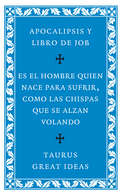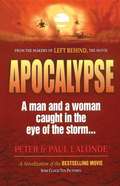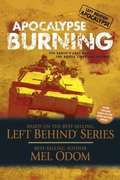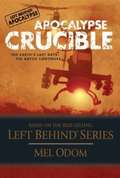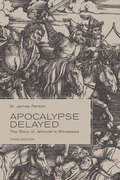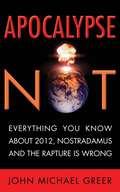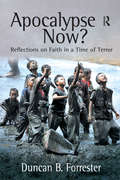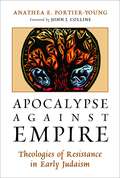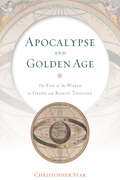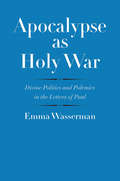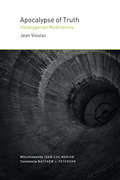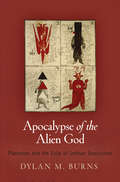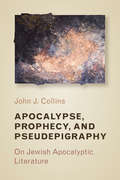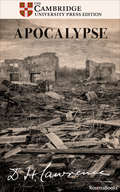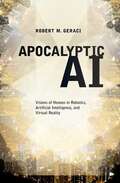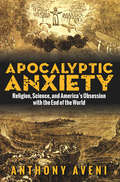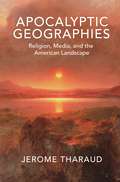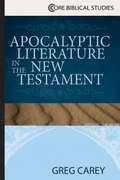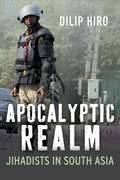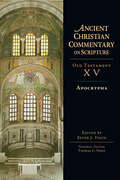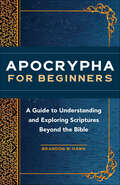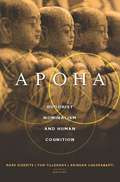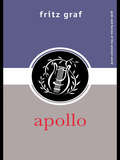- Table View
- List View
Apocalipsis y Libro de Job (Serie Great Ideas #27)
by AnónimoIdeas que han cambiado el mundo. A lo largo de la historia, algunos libros han cambiado el mundo. Han transformado la manera en que nos vemos a nosotros mismos y a los demás. Han inspirado el debate, la discordia, la guerra y la revolución. Han iluminado, indignado, provocado y consolado. Han enriquecido vidas, y también las han destruido. Taurus publica las obras de los grandes pensadores, pioneros, radicales y visionarios cuyas ideas sacudieron la civilización y nos impulsaron a ser quienes somos. Estos dos libros de la Biblia, que ofrecían un enorme consuelo a los primeros creyentes, influyeron profundamente en el ascenso de la Iglesia cristiana y en su inmensa tradición artística: el Apocalipsis narra el triunfo final de la religión sobre sus enemigos, mientras que el Libro de Job describe la fe de un hombre que debe enfrentarse a increíbles adversidades. Comentarios sobre la colección Great Ideas:«De veras que la edición es primorosa y pocas veces contenido y continente pueden encontrarse mejor ensamblados y unidos. ¡Qué portadas! Para enmarcar. [...] Ante las Great Ideas, solo cabe quitarse el sombrero. ¡Chapeau!»ABC «Taurus propone un doble envite con este lanzamiento. Por un lado aumenta su compromiso con el ensayo; por otro, recupera el gusto por la estética. A los volúmenes se les ha proporcionado una portada delicada y cuidada (copian el original británico) que invita a la lectura.»La Razón «Un fenómeno editorial.»The Guardian «Aparte de los contenidos, en general muy bien elegidos, son tan bonitos que si los ven seguro que cae alguno.»El País «Ideas revolucionarias, crónicas de exploraciones, pensamientos radicales... vuelven a la vida en estas cuidadísimas ediciones, muy atractivas para nuevos lectores.»Mujer Hoy «Grandes ideas bien envueltas. De Cicerón a Darwin, esta colección entra por los ojos.»Rolling Stone «Original y bella iniciativa la emprendida por Taurus con su colección Great Ideas.»Cambio 16 «Hay libros inmortales, libros únicos que contienen pensamientos y reflexiones capaces de cambiar el mundo, tesoros en miniatura reagrupados en la colección Great ideas.»Diario de León
Apocalypse
by Peter Lalonde Paul LalondeNuclear missiles fill the skies and the world waits for the end to come. However, suddenly, mysteriously, the missiles vanish, along with 187 million people. In an incredible sequence of scenes, readers are treated to a firsthand look at what the world might be like in the minutes and hours following the Rapture. This exciting novel is based on the video of the same name that has sold over 300,000 copies. It is the first in a series of fast-paced end-time thrillers.
Apocalypse Burning (Left Behind - Apocalypse #3)
by Mel OdomFirst Sergeant Samuel Adams "Goose" Gardner is on the front lines, fighting a battle against superior forces. Goose's wife, Megan, is fighting for her freedom in a court case where all the facts seem stacked against her. Meanwhile, Chaplain Delroy Harte had taken a leave from his ship, the U.S.S. Wasp and returned home to Marbury, Alabama. He believes that the rapture may have happened but can't be sure until he has dealt with the demons of his past.
Apocalypse Crucible (Left Behind - Apocalypse #2)
by Mel OdomDanger and personal crisis on land, sea and in the air combine with a level of spiritual warfare that is unparalleled in a Christian book. This book is a page turning thriller that runs side-by-side with the phenomenal Left Behind series. The world is exploding in confusion and terror following the disappearances in book #1: Apocalypse Dawn. Meanwhile, Army Rangers and Marine Special Ops forces are struggling to keep the peace, while fighting spiritual battles of their own in the sands of Turkey and back home. Stunning action, with technical accuracy of best-selling military thrillers, this new series will satisfy the fans of original Left Behind series that are looking for more.
Apocalypse Dawn (Left Behind - Apocalypse #1)
by Mel OdomFrom the decks of U.S. Navy carriers patrolling the Mediterranean to Fort Benning, Georgia, and the dusty sands of the Turkish-Syrian border, this new suspense thriller runs side by side with the phenomenal series that has sold more than 50 million copies. New characters and situations are added to those from the already explosive Left Behind series to raise the tension to a fever pitch. With technical accuracy from the same people who create best-selling military thrillers, this new series will satisfy the fans of the original Left Behind series who are looking for more.
Apocalypse Delayed
by M. James PentonSince 1876, Jehovah's Witnesses have believed that they are living in the last days of the present world. Charles T. Russell, their founder, advised his followers that members of Christ's church would be raptured in 1878, and by 1914 Christ would destroy the nations and establish his kingdom on earth. The first prophecy was not fulfilled, but the outbreak of the First World War lent some credibility to the second. Ever since that time, Jehovah's Witnesses have been predicting that the world would end "shortly." Their numbers have grown to many millions in over two hundred countries. They distribute a billion pieces of literature annually, and continue to anticipate the end of the world.For almost thirty years, M. James Penton's Apocalypse Delayed has been the definitive scholarly study of this religious movement. As a former member of the sect, Penton offers a comprehensive overview of the Jehovah's Witnesses. His book is divided into three parts, each presenting the Witnesses' story in a different context: historical, doctrinal, and sociological. Some of the issues he discusses are known to the general public, such as the sect's opposition to military service and blood transfusions. Others involve internal controversies, including political control of the organization and the handling of dissent within the ranks.Thoroughly revised, the third edition of Penton's classic text includes substantial new information on the sources of Russell's theology and on the church's early leaders, as well as coverage of important developments within the sect since the second edition was published fifteen years ago.
Apocalypse Not
by John Michael GreerFor almost 3,000 years apocalypse prophecies have convinced people all over the world that the future is about to give them the world they want instead of the world they've got. All the end time prophecies splashed across the media in every age have had something else in common: every one of them has been wrong. Apocalypse Not is a lively and engaging survey of predictions about the end of the world, along with the failed dreams and nightmares that have clustered around them. Among the stories highlighted in Apocalypse Not are: the birth of the apocalypse meme out of archaic star myths in the ancient Middle East; the failed end time prophecies of Nostradamus, Mother Shipton, and other famous prophets; the long and murky road from the Great Pyramid to today's Rapture beliefs; and the real origins of the belief in apocalypse in 2012 (hint: it's not originally Mayan at all).
Apocalypse Not: Everything You Know About 2012, Nostradamus and the Rapture Is Wrong
by John GreerFor almost 3,000 years apocalypse prophecies have convinced people all over the world that the future is about to give them the world they want instead of the world they've got. All the end time prophecies splashed across the media in every age have had something else in common: every one of them has been wrong. Apocalypse Not is a lively and engaging survey of predictions about the end of the world, along with the failed dreams and nightmares that have clustered around them. Among the stories highlighted in Apocalypse Not are: the birth of the apocalypse meme out of archaic star myths in the ancient Middle East; the failed end time prophecies of Nostradamus, Mother Shipton, and other famous prophets; the long and murky road from the Great Pyramid to today's Rapture beliefs; and the real origins of the belief in apocalypse in 2012 (hint: it's not originally Mayan at all).
Apocalypse Now?: Reflections on Faith in a Time of Terror
by Duncan B. ForresterHow may people of faith respond wisely, constructively, and courageously to the challenges of a time of terror? How might religious reasons in public debate be a force for reconciliation rather than violence and hatred? In a world in which religious arguments and religious motivations play such a huge public role, there is an urgent responsibility for interpreting what is happening, and engaging with religious views which are commonly regarded as alien, threatening or dangerous. In Apocalypse Now?, Duncan Forrester argues that disorders and atrocities which include the Gulag, the Holocaust, 9/11, the Afghanistan and Iraq wars, and the Tsunami disaster have shown us that we stand not at the end of history but in the midst of an apocalyptic age of terror which has striking similarities to the time in which Christianity was born. Moving between two times of terror - the early Centuries of Christianity, and today - Forrester asks how religious motivations can play a positive role in the midst of conflicts and disasters. Reading the 'signs of the times' to try to understand what is happening in today's age of terror, Forrester argues that there are huge resources in the Christian tradition that can be productively deployed for a more constructive and faithful response. We are at a turning point - this is a book which should be read.
Apocalypse against Empire: Theologies of Resistance in Early Judaism
by Anathea E. Portier-YoungA fresh and daring take on ancient apocalyptic books. The year 167 b.c.e. marked the beginning of a period of intense persecution for the people of Judea, as Seleucid emperor Antiochus IV Epiphanes attempted — forcibly and brutally — to eradicate traditional Jewish religious practices. In Apocalypse against Empire Anathea Portier-Young reconstructs the historical events and key players in this traumatic episode in Jewish history and provides a sophisticated treatment of resistance in early Judaism. Building on a solid contextual foundation, Portier-Young argues that the first Jewish apocalypses emerged as a literature of resistance to Hellenistic imperial rule. She makes a sturdy case for this argument by examining three extant apocalypses, giving careful attention to the interplay between social theory, history, textual studies, and theological analysis. In particular, Portier-Young contends, the book of Daniel, the Apocalypse of Weeks, and the Book of Dreams were written to supply an oppressed people with a potent antidote to the destructive propaganda of the empire — renewing their faith in the God of the covenant and answering state terror with radical visions of hope..
Apocalypse and Golden Age: The End of the World in Greek and Roman Thought
by Christopher StarHow did the ancient Greeks and Romans envision the end of the world?What is the long-term future of the human race? Will the world always remain as it is or will it undergo a catastrophic change? What role do the gods, human morality, and the forces of nature play in bringing about the end of the world? In Apocalypse and Golden Age, Christopher Star reveals the answers that Greek and Roman authors gave to these questions. The first large-scale investigation of the various scenarios for the end of the world in classical texts, this book demonstrates that key thinkers often viewed their world as shaped by catastrophe. Star focuses on how this theme was explored over the centuries in the works of poets, such as Hesiod, Vergil, Ovid, and Lucan, and by philosophers, including the Presocratics, Plato, Epicurus, Lucretius, Cicero, and Seneca. With possibilities ranging from periodic terrestrial catastrophes to the total dissolution of the world, these scenarios address the ultimate limits that define human life and institutions, and place humanity in the long perspective of cosmic and natural history. These texts also explore various options for the rebirth of society after world catastrophe, such as a return of the Golden Age or the redevelopment of culture and political institutions. Greek and Roman visions of the end, Star argues, are not calls to renounce this world and prepare for a future kingdom. Rather, they are set within larger investigations that examine and seek to improve personal and political life in the present. Contextualizing classical thought about the apocalypse with biblical studies, Star shows that the seeds of our contemporary anxieties about globalization, politics, and technology were sown during the Roman period. Even the prevalent link between an earthly leader and the beginning of the end times can be traced back to Greek and Roman rulers, the emperor Nero in particular. Apocalypse and Golden Age enriches our understanding of apocalyptic thought.
Apocalypse as Holy War: Divine Politics and Polemics in the Letters of Paul (The Anchor Yale Bible Reference Library)
by Emma WassermanPrevailing theories of apocalypticism assert that in a world that rebels against God, a cataclysmic battle between good and evil is needed to reassert God’s dominion. Emma Wasserman, a rising scholar of early Christian history, challenges this interpretation and reframes Paul’s apocalyptic texts as myths about politics in the world of divinity. Wasserman argues that the most dominant historical-critical theories about Christian apocalypticism are ahistorical and tend to work with apologetic formulations of Christ’s victory and the uniqueness of Christianity. Assessing Paul’s claims about immanent war, divine enemies, and the transformation that will accompany Christ’s return, Wasserman sees him as envisioning a single, righteously ruled cosmic kingdom, the true nature of which will soon be revealed to all. A major scholarly contribution that ranges across Mediterranean and West Asian religious thought, this volume has broad implications for understanding Paul’s myth of heroic submission as well as his most distinctive ethical teachings.
Apocalypse of Truth: Heideggerian Meditations
by Jean VioulacWe inhabit a time of crisis—totalitarianism, environmental collapse, and the unquestioned rule of neoliberal capitalism. Philosopher Jean Vioulac is invested in and worried by all of this, but his main concern lies with how these phenomena all represent a crisis within—and a threat to—thinking itself. In his first book to be translated into English, Vioulac radicalizes Heidegger’s understanding of truth as disclosure through the notion of truth as apocalypse. This “apocalypse of truth” works as an unveiling that reveals both the finitude and mystery of truth, allowing a full confrontation with truth-as-absence. Engaging with Heidegger, Marx, and St. Paul, as well as contemporary figures including Giorgio Agamben, Alain Badiou, and Slavoj Žižek, Vioulac’s book presents a subtle, masterful exposition of his analysis before culminating in a powerful vision of “the abyss of the deity.” Here, Vioulac articulates a portrait of Christianity as a religion of mourning, waiting for a god who has already passed by, a form of ever-present eschatology whose end has always already taken place. With a preface by Jean-Luc Marion, Apocalypse of Truth presents a major contemporary French thinker to English-speaking audiences for the first time.
Apocalypse of the Alien God: Platonism and the Exile of Sethian Gnosticism (Divinations: Rereading Late Ancient Religion)
by Dylan M. BurnsIn the second century, Platonist and Judeo-Christian thought were sufficiently friendly that a Greek philosopher could declare, "What is Plato but Moses speaking Greek?" Four hundred years later, a Christian emperor had ended the public teaching of subversive Platonic thought. When and how did this philosophical rupture occur? Dylan M. Burns argues that the fundamental break occurred in Rome, ca. 263, in the circle of the great mystic Plotinus, author of the Enneads. Groups of controversial Christian metaphysicians called Gnostics ("knowers") frequented his seminars, disputed his views, and then disappeared from the history of philosophy—until the 1945 discovery, at Nag Hammadi, Egypt, of codices containing Gnostic literature, including versions of the books circulated by Plotinus's Christian opponents. Blending state-of-the-art Greek metaphysics and ecstatic Jewish mysticism, these texts describe techniques for entering celestial realms, participating in the angelic liturgy, confronting the transcendent God, and even becoming a divine being oneself. They also describe the revelation of an alien God to his elect, a race of "foreigners" under the protection of the patriarch Seth, whose interventions will ultimately culminate in the end of the world.Apocalypse of the Alien God proposes a radical interpretation of these long-lost apocalypses, placing them firmly in the context of Judeo-Christian authorship rather than ascribing them to a pagan offshoot of Gnosticism. According to Burns, this Sethian literature emerged along the fault lines between Judaism and Christianity, drew on traditions known to scholars from the Dead Sea Scrolls and Enochic texts, and ultimately catalyzed the rivalry of Platonism with Christianity. Plunging the reader into the culture wars and classrooms of the high Empire, Apocalypse of the Alien God offers the most concrete social and historical description available of any group of Gnostic Christians as it explores the intersections of ancient Judaism, Christianity, Hellenism, myth, and philosophy.
Apocalypse, Prophecy, and Pseudepigraphy: On Jewish Apocalyptic Literature
by John J. CollinsA highly regarded expert on the Jewish apocalyptic tradition, John J. Collins has written extensively on the subject. Nineteen of his essays written over the last fifteen years, including previously unpublished contributions, are brought together for the first time in this volume. Its thematic essays organized in five sections, Apocalypse, Prophecy, and Pseudepigraphy complements and enriches Collins’s well-known book The Apocalyptic Imagination.
Apocalypse: And the Writings on Revelation (The Definitive Cambridge Editions of D.H. Lawrence)
by D. H. LawrenceThis collection of writings by the author of Sons and Lovers presents his thoughts on religion, art, psychology and politics in a newly restored text. Though D. H. Lawrence was one of the great writers of the twentieth century, his works were severely corrupted by the stringent house-styling of printers and the intrusive editing of timid publishers. A team of scholars at Cambridge University Press has worked for more than thirty years to restore the definitive texts of D. H. Lawrence in The Cambridge Editions. Written while he was dying, Apocalypse is Lawrence&’s final book. In it, he presents both a radical criticism of our civilization and a statement of unwavering belief in man&’s power to create &“a new heaven and a new earth.&” This volume also includes Lawrence&’s review of Book of Revelationby John Orman, and his Introduction to The Dragon of the Apocalypseby Frederick Carter. The Appendixes also present previously unpublished material on Revelation.
Apocalyptic AI: Visions of Heaven in Robotics, Artificial Intelligence, and Virtual Reality
by Robert M. GeraciApocalyptic AI, the hope that we might one day upload our minds into machines or cyberspace and live forever, is a surprisingly wide-spread and influential idea, affecting everything from the world view of online gamers to government research funding and philosophical thought. In Apocalyptic AI, Robert Geraci offers the first serious account of this "cyber-theology" and the people who promote it. Drawing on interviews with roboticists and AI researchers and with devotees of the online game Second Life, among others, Geraci illuminates the ideas of such advocates of Apocalyptic AI as Hans Moravec and Ray Kurzweil. He reveals that the rhetoric of Apocalyptic AI is strikingly similar to that of the apocalyptic traditions of Judaism and Christianity. In both systems, the believer is trapped in a dualistic universe and expects a resolution in which he or she will be translated to a transcendent new world and live forever in a glorified new body. Equally important, Geraci shows how this worldview shapes our culture. Apocalyptic AI has become a powerful force in modern culture. In this superb volume, he shines a light on this belief system, revealing what it is and how it is changing society.
Apocalyptic Anxiety: Religion, Science, and America's Obsession with the End of the World
by Anthony AveniApocalyptic Anxiety traces the sources of American culture’s obsession with predicting and preparing for the apocalypse. Author Anthony Aveni explores why Americans take millennial claims seriously, where and how end-of-the-world predictions emerge, how they develop within a broader historical framework, and what we can learn from doomsday predictions of the past. The book begins with the Millerites, the nineteenth-century religious sect of Pastor William Miller, who used biblical calculations to predict October 22, 1844 as the date for the Second Advent of Christ. Aveni also examines several other religious and philosophical movements that have centered on apocalyptic themes—Christian millennialism, the New Age movement and the Age of Aquarius, and various other nineteenth- and early twentieth-century religious sects, concluding with a focus on the Maya mystery of 2012 and the contemporary prophets who connected the end of the world as we know it with the overturning of the Maya calendar. Apocalyptic Anxiety places these seemingly never-ending stories of the world’s end in the context of American history. This fascinating exploration of the deep historical and cultural roots of America’s voracious appetite for apocalypse will appeal to students of American history and the histories of religion and science, as well as lay readers interested in American culture and doomsday prophecies.
Apocalyptic Geographies: Religion, Media, and the American Landscape
by Jerome TharaudHow nineteenth-century Protestant evangelicals used print and visual media to shape American cultureIn nineteenth-century America, "apocalypse" referred not to the end of the world but to sacred revelation, and "geography" meant both the physical landscape and its representation in printed maps, atlases, and pictures. In Apocalyptic Geographies, Jerome Tharaud explores how white Protestant evangelicals used print and visual media to present the antebellum landscape as a “sacred space” of spiritual pilgrimage, and how devotional literature influenced secular society in important and surprising ways.Reading across genres and media—including religious tracts and landscape paintings, domestic fiction and missionary memoirs, slave narratives and moving panoramas—Apocalyptic Geographies illuminates intersections of popular culture, the physical spaces of an expanding and urbanizing nation, and the spiritual narratives that ordinary Americans used to orient their lives. Placing works of literature and visual art—from Thomas Cole’s The Oxbow to Harriet Beecher Stowe’s Uncle Tom’s Cabin and Henry David Thoreau’s Walden—into new contexts, Tharaud traces the rise of evangelical media, the controversy and backlash it engendered, and the role it played in shaping American modernity.
Apocalyptic Literature in the New Testament (Core Biblical Studies)
by Greg CareyEvery significant layer of the New Testament features the distinctiveconcerns of apocalyptic literature, including the expectation of amessiah, hope for a resurrection, expectation of a final judgment, and aspiritual world that includes angels and demons. Yet many contemporaryreaders shy away from things apocalyptic, especially the book ofRevelation. This introduction considers the influence ofapocalyptic literature throughout the Gospels and Acts, Paul’s letters,and Revelation. It argues that early Christian authors drew uponapocalyptic topics to address an impressive array of situations andconcerns, and it demonstrates—example after example—how apocalypticdiscourse contributed to their ongoing work of contextual theology.
Apocalyptic Realm
by Dilip HiroThis hard-hitting and timely book explores the roots of militant Islam in South Asia and how it has grown to become a source of profound global alarm. By meticulously tracking the rise of the jihadist movement from its initial violence in Afghanistan in 1980 to the present day, Dilip Hiro challenges conventional narratives of the roles of Afghanistan, Pakistan, the Soviet Union, the United States, and India. He warns that the Line of Control in Kashmir, where jihadists seek to incite war between nuclear-armed Pakistan and India, is today the most dangerous border in the world. Drawing on evidence from a wide variety of sources including newly released Kremlin archives and classified U. S. Embassy documents published by WikiLeaks, the author compiles the first complete and accurate history of Islamist terrorism in South Asia. He chronicles historic links between Pakistan, Afghanistan, and India and their varying degrees of destabilization at the hands of the jihadists. He also sheds unprecedented light on the close military and intelligence links that have developed between India and Israel. Finally, he outlines the ambitions of Pakistani, Afghan, and Al Qaeda jihadists to establish an "apocalyptic realm" covering South, Central, and Western Asia. Compact, comprehensive, and fast paced, this book lays bare the causes of today's escalating terrorist threat, sets the historical record straight, and offers fresh strategies for defeating jihadist extremism.
Apocrypha (Ancient Christian Commentary on Scripture #15)
by Sever J. VoicuThis last volume of the Ancient Christian Commentary on Scripture offers commentary from the early church fathers on the deuterocanonical books of the Bible, with insights that will be of great benefit to preachers and teachers alike. Readers will find some ancient authors translated into English here for the first time. Throughout they will gain insight and encouragement in the life of faith as seen through ancient pastoral eyes.
Apocrypha for Beginners: A Guide to Understanding and Exploring Scriptures Beyond the Bible
by Brandon W. HawkGo beyond the Bible with this simple introduction to apocryphaWhether they were lost, cut, or censored, the various apocryphal stories offer unique opportunities to learn about the histories of Judaism and Christianity while broadening spiritual understanding. But exploring this vast canon of texts alone can be daunting. Apocrypha for Beginners makes it simple by offering a guided experience, helping explain each piece's importance and contextualize its place in history.This standout among religious books includes:More than 50 apocrypha—Delve into a variety of apocrypha from different eras and cultures, like the Book of Enoch, the Gospel of Judas, and more.In-depth commentary—Better understand each text with a brief summary of its origin, meaning, and cultural significance.Easy-to-follow info—Explore the history of Judaism and Christianity with the help of a detailed timeline, canon comparison chart, and index of important individuals.Take your Bible study to the next level with Apocrypha for Beginners.
Apoha: Buddhist Nominalism and Human Cognition
by Mark Tom Tillemans Arindam Chakrabarti Eds. SideritsWhen we understand that something is a pot, is it because of one property that all pots share? This seems unlikely, but without this common essence, it is difficult to see how we could teach someone to use the word "pot" or to see something as a pot. The Buddhist apoha theory tries to resolve this dilemma, first, by rejecting properties such as "potness" and, then, by claiming that the element uniting all pots is their very difference from all non-pots. In other words, when we seek out a pot, we select an object that is not a non-pot, and we repeat this practice with all other items and expressions.Writing from the vantage points of history, philosophy, and cognitive science, the contributors to this volume clarify the nominalist apoha theory and explore the relationship between apoha and the scientific study of human cognition. <P><P>They engage throughout in a lively debate over the theory's legitimacy. Classical Indian philosophers challenged the apoha theory's legitimacy, believing instead in the existence of enduring essences. Seeking to settle this controversy, essays explore whether apoha offers new and workable solutions to problems in the scientific study of human cognition. They show that the work of generations of Indian philosophers can add much toward the resolution of persistent conundrums in analytic philosophy and cognitive science.
Apollo (Gods and Heroes of the Ancient World)
by Fritz GrafFritz Graf here presents a survey of a god once thought of as the most powerful of gods, and capable of great wrath should he be crossed: Apollo the sun god. From his first attestations in Homer, through the complex question of pre-Homeric Apollo, to the opposition between Apollo and Dionysos in nineteenth and twentieth-century thinking, Graf examines Greek religion and myth to provide a full account of Apollo in the ancient world. For students of Greek religion and culture, of myth and legend, and in the fields of art and literature, Apollo will provide an informative and enlightening introduction to this powerful figure from the past.
